#i will sniff out any and all tiny tidbits of knowledge about him no matter how irrelevant
Text
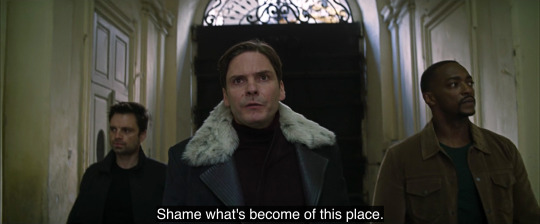
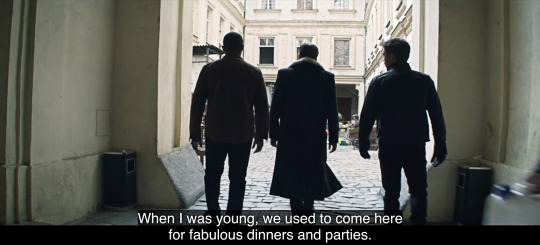
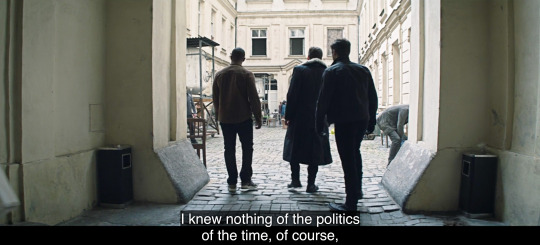
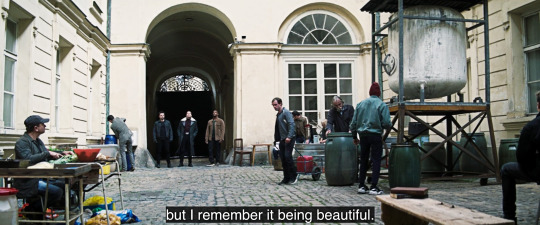
taking screenshots for an episode 4 'breakdown' thing but it's taking just sooo long and I'm distracted with too many thoughts that I'm probably just going to trickle them out in separate posts
so here's one illuminating something I didn't catch before regarding Zemo's Riga apartment: it's suggested that Zemo hadn't been in the area since he was young. i'm assuming very young since he didn't understand the politics at the time and Zemo strikes me as the type to understand things like that at a very early age.
therefore it's logical to assume that the Riga apartment is an old family vacation home that was used for trips that involved a lot of business/political talk (always safe to assume Hydra here because when is it not?) and not a place Zemo had ever visited in adulthood.
which then brings up even more interesting points:
if Zemo hadn't been to the Riga apartment since childhood how did he know about the escape route under the bath tube? he must have been shown by someone when he was a kid, right? a parent maybe? did it have to be used before?
the Riga apartment being an old Zemo Family Estate totally changes how it reflects Zemo personally. it's now not a place he chose or furnished himself. it's again a part of his mask. the wealth and glamor doesn't speak to Zemo's true tastes or comforts or things he would have in his own home (necessarily). again, we know very little about who he truly is.
also there's a sort of sad nostalgia when you go back to a place you used to as a kid. did Zemo feel anything sentimental being back in a place that he used to spend time with his parent(s)? does it bring back fond memories of not knowing 'the politics' at the time? i'd like to know marvel, thnx.
him rummaging around in the cupboards looking for Turkish Delights is cast in a different light too. he literally doesn't know where they are! he's like a kid looking for sweets. making it even more sense that he finds them in some sort of vase, almost as if an adult was trying to hide them from a little thief. Zemo too, probably loved Turkish Delights as a kid and it was a struggle to keep them away from him.
furthermore, Zemo now jump-scaring Karli and cutting off her exit from the funeral makes so much more sense. instead of him just appearing out of nowhere without reason, it would be logical to assume that he knows the area like she would; as a kid he probably traversed all over the complex and would know exactly where she would run to get away.
anyway, it might have just been me that didn't catch this the first time but thought i'd share if anyone thought it was interesting or didn't notice it like I did. this is also why you should never invite me over to watch something because i'll unnecessarily deconstruct every little bit lol
#stay tuned for more of my treasure hunts for tiny zemo information#i must know this character#i will sniff out any and all tiny tidbits of knowledge about him no matter how irrelevant#like a truffle pig#also not to make this#winterbaron#but there's opportunity for having sex in a childhood bed thing here soooo#zemo#helmut zemo#baron zemo#daniel brühl#daniel bruhl#tfatws#mcu#marvel#also i'm aware that the place where karli is hiding out and zemo's apartment are two different places#it's how the line is written and other bits like the cupboards thing and saying 'i know of a place' in the jet that come together#to imply that the Riga apartment wasn't super personal like a vacation home he himself bought or frequented as an adult#and more like a place he knew of as a child#which is honestly more interesting to me and continues the trend in tfatws of Zemo using his Family's/Father's things#almost as a costume#(i have a whole other post speculating on Zemo's mask and coat being his father's he's using for the first time ho boy)
523 notes
·
View notes
Text
queen of peace
Part 1/10
Shifty Powers x Reader
Summary: He fights with a rifle, you with a needle. When the toll of taking lives grows too high on him, you’re there to stitch his ripped seams and patch him together again (after all, you’re awfully good at taking what’s old and giving it new life)
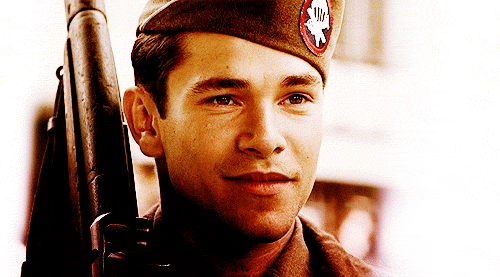
You think of the War as bolts of fabric clustering the high shelves of Mother’s workshop—that first warm, dry September is silk, when politicians blustered over the radio, spewing threats and spittle, but women would turn down the volume knob so they could order simpering cocktail gowns with a slit up to there. Wool is the following winter, dyed peacock blue to stain your fingers as you coaxed the boring needing in-and-out, in-and-out to attach a fresh fox fur from the autumn hunts for a New Year’s Eve cape. Then, spring bathed hot breaths on the snow and ice, and the radio buzzed so loud with news bulletins—the Netherlands invaded! Norway invaded! France invaded!—that no one dared reach for the knobs. It’s cotton, repressive in its purest form, and undesirable as the summer months swallowed you, Mother, and all of Europe whole. The months after, you’ll admit, you don’t think of as fabrics: instead, you see the receding stack of order slips on Mother’s desk, the bolts wound down to their cardboard bases and never replenished as those months of huddled terror bleed into years of exhausted fear. A fear so continuous, so daily, it has become a mundane reality: German bombs may rain down at any moment, even on tiny Aldbourne.
More pressing, it seems, is the grasping fingers of hunger digging out your stomach, of worry gnawing at your bone marrow, always wondering where the coin may come from to by next week’s groceries or pay this week’s bills. What did it matter if hellfire and fury choked out your life? You and Mother face down the reality you’re too expensive to live, anyway.
Then, the Americans come.
You know they came a week before—you’d need to deaf to not hear the procession of snorting Jeeps and grumbling transport trucks creeping underneath the workshop and your bedroom windows at all hours—but you don’t see evidence of them about town.
“It’s because they’re doing How to be English classes up at the base. I’ve met an American, and that’s what he told me,” Margaret informs you, eyebrows waggling, as she leans over the postmaster’s counter, elbows braced and shoulders hunched conspiringly. As the postmaster’s daughter, Margaret often lingers around the office, feigning offering her ‘help’ as an attempt to sniff out tidbits of town gossip. Yet, back when bolts of snow-white muslin, soft as a springtime breeze, or real China silk, shimmering and canary yellow, arrived for you and your Mother’s orders, she’d insist of squealing over it with you. She’s a good friend. “They’ve got mountains of letters back there, you know. Dad’s going bonkers.”
Knowing Margaret’s definition of ‘bonkers’ encompassed both good things—like the annual Midsummer Ice Cream Social—and bad things—like pop arithmetic classes back when you were in grammar school together—you ask, “Is he all right?”
“Well, he has me, doesn’t he? Free labor and all that.” Frowning, she squints at you, adding, “Aren’t you going to ask me if I’m all right? I’m doing all the heavy lifting, here!” Laughing, you shake your head, and Margaret seems pleased to have caused a laugh and contents herself to a conspiring wink: “I’ve been meaning to tell you, some American officers are being housed in the village . . .” Another eyebrow waggle that, frankly, ought to be illegal.
Eyeing Margaret’s grin, you point out, “Your dad would have a conniption if an American officer got within ten feet of you.”
Obviously imaging her father’s temple vein bulging worryingly, Margaret frowns. “You’re right.” She sounds more disappointed than she has any right to be. She puffs a breath, her bangs fluttering. “Then there’s Tommy Beale, of course.”
It’s your turn to roll your eyes; Margaret and Tommy have been dancing around each other since first grade, gifting each other with shiny baubles, hurried kisses on the cheek, and brilliant blushes. It reminds you of a nature program you once listened to on the BBC as you sewed a kimono (a pink pearl silk confection, ordered after a particularly luxurious London socialite returned from a steamer-ship trip to Japan and was ‘dying’ for her own kimono) that described how a certain type of bird in the Amazon would ritualistic dance around its desired mate in great, skittery hops, never truly engaging. You doubt Margaret would appreciate the metaphor.
The bell above the office door tinkles, Margaret straightening and her eyes sparking. “Private Vest!” she greets. You turn, eyebrows raised.
Evidently, the boy with a rounded nose and an easy grin, currently moving in great strides to belly up to the post counter is the one American Margaret has met. Only, it’s not one American in the office; a second lingers by the door, a dark-haired young man who seems unsure if he should follow Vest, swiped-off cap worked into a crumpled wad in his nervous hands. His eyes flit to you—and it may be your imagination, Lord knows it runs awry when you’re sewing for hours—but pink seems to trickle into his cheeks. “Heya, Maggie,” the first American greets.
“Nice of you to show your face, Vest,” Margaret—since when has she ever introduced herself as ‘Maggie,’ you wonder—returns. To you, she adds: “Y/n, be friendly, why don’t you, and say hello. This is Private Vest, the post officer for the Americans.”
Offering his hand, Vest says, “Pleasure to meet you, but I’m not the only mail boy.” He jerks his chin to the other American boy. “Of course, lucky Shifty over here has only been assigned to help me for the day. Word is you’ve got quite a backlog of mail for me, Maggie?” His eyes dart back to her.
“An understatement,” she intones before waving Vest around the counter. As the two disappear into the sorting room, the door swinging in their wake, Margaret says: “Come witness the horror yourself.”
You watch the door, creaking on its hinges, until it eases to a stop, slightly ajar and allowing Vest’ exclamation over the sheer amount of post awaiting him to slip out. Yet, without Margaret, the post office feels stilled—silent and tense—and your skin prickles with the knowledge of the other American lurking at the door, somewhere behind you, unseen unless you pointedly turn around. It’d require you breaking the palpable awkwardness. A blush creeps up from beneath your collar at the mere thought.
The creak of weight moving over floorboards. Then, the American leans against the counter at your side. You try very hard not to squeak in surprise (you’re fairly sure you don’t succeed).
Your eyes dare to dart to his sleeve—olive green, an eagle patch, two puckering, pinky-sized holes—and away, as if you might be caught staring. Silence; he stands still at your side. You dare to look at the uniform’s shirtfront—a silver pair of wings, medals—and away again just as quickly.
A cleared throat. Measured words, as if the American isn’t sure he should speak at all—as if he’s been mightily debating it and still doesn’t quite agree with his decision: “Pardon me, ma’am; I don’t mean to make you uncomfortable . . . I, uh,” He fumbles to a stop, apparently stricken with a thought. “I’m sorry, but are you uncomfortable? I shouldn’t have assumed, I suppose, um . . .” As he talks, you focus on your fingers, half-curled on the counter, to keep from getting hot all-over at the thought of the boy’s liquid eyes on you, darker than a nighttime sky.
His accent softens his voice, melting the vowels and blurring the consonances, and you’re reminded of sticks of butter, set out for baking. You feel the warm sigh of an oven door opening in his words, and at the edge of the air, you can almost taste sugar cookies fresh from baking. It’s been years since you’ve had real butter or white sugar, since you could afford such luxuries as baked goods. You wistfully dream of sweets, speculating if you truly remember the taste, before your eyes involuntarily dart to his lips. A thought flits through your head: Would he taste just as sweet?
Blinking away your daydreams, fighting the sinking horror at yourself and your own silliness, you reply, “Um, no, that’s all right—err, that is, I’m all right. Unless, are you uncomfortable?”
It strikes you briefly that this is a ridiculous conversion, exchanged more to the counter you both stare determinedly at than to each other. He replies, words tripping over each other in their rush: “Of course not! I just thought I ought to say something since we were both standing here and . . .” His rush leaves him winded and unsure how to continue.
Smiling, taking pity on him—you can imagine that earlier blush you saw him wearing deepening now, but you’re too shy to peek and confirm—you offer, “We could always get to know each other with some questions.”
“Oh!” he exclaims, relieved, “Yes, that’s a good idea. So, um, do you, um, live here? In Aldbourne, that is?”
“Yes, I do, with my mother. We’re seamstresses,” you reply. “What about you? Where are you from in America?”
“Virginia,” he replies, and you note the glow of pride in the single word, the puff of his chest you register in your periphery.
Hoping to elicit the same reaction again, you prod, “What did you do in Virginia?”
“Worked for a few years before all of this, but I spent my younger years hunting. I ran all over the forest and mountains, pretending like I was the first one to ever see it. Like I was in one of those adventure books my Pa read to me at night.”
“My Mother read Treasure Island to me when I was a girl,” you share, smile soft at the memory.
You feel him smiling at your smile. “That’s one of my Pa’s favorites, too, though I always wanted him to read Huckleberry Finn over, and over, and over again. He read it so much it began to fall apart!” Pause, then: “Have you read it?”
“No, I don’t believe so?”
“Well, you ought to; maybe I’m inclined to liking it because I like the idea of a barefoot boy being the hero, but I think it’s real good.” He says it with enough conviction, that you’re half-tempted to scamper to Aldbourne’s modest library that very second. He hums thoughtfully. “You know, even though I read all those adventures, I’ve never actually been farther than fifty miles from home before now.”
“This must be some change, huh?” you ask, coaxing yourself to look at him at an angle, hiding behind your fluttering lashes. It’s easier to look at him sideways, to pretend like you’re still talking to the counter, than face this strange American boy with a soft voice and nervous hands and hurrying words. Somehow, and you can’t say why, looking at him squarely seems like too much too soon.
“Yeah, I reckon so.” Silence, and you track how his fingers wring his cap. You want to snatch it from his hands, to hurry home to the workshop and take the iron—always hot and ready to press a sewn piece once it is deemed finished—to the wrinkles the boy is working in to it. “I’m Shifty, by the way. It’s my nickname, so if you don’t want to call me that, my real name is Darrell.”
“Does anyone call you Darrell?” you ask, though you like turning his nickname over and over in your head, pretending to say it in varying tones and registers, fascinated with the warmth it sends, flooding your limbs.
“Um, well, no, ma’am.”
You grin, finally prompted into meeting his eyes and a soft ‘oh’ escapes your parted lips. Darker than nighttime, his eyes met yours steadily. A depth makes them appear to gleam—a liquid night—yet the brown isn’t monochrome: light catches from the scones on the walls, the overhead fixture, sending twinkling stars into those eyes, a constellation with more unknowns and mysteries than the cosmos.
Suddenly, it becomes very pressing to think of something to say. You point to his sleeves, managing to squeak out: “Holes!”
“Huh?” Your insides tighten, shriveling into themselves, because he tilts his head ever so slightly in confusion and you could faint under that angle of those inquiring eyebrows.
You train your eyes on the holes in his uniform, focusing hard on formulating a coherent sentence. “The holes in your sleeves: I can fix them for you; patch them and have it good as new.”
“Holes?” he repeats, alarm coloring the word as he grabs at his sleeve, raising the fabric for his inspection. His face blanches. “Ah, gee, Sobel is going to murder me,” he mutters.
You repeat your offer, tacking on: “I can get it done before tea time, even.”
“Would you?” Shifty exclaims, dropping his sleeve to snatch up one of your hands. Every nerve in you sings with the contact—his hard callouses from soldiering slotting against yours from sewing; you’ll later think the sensation is quite lovely, really—while your muscles stiffen, screaming with panic. “I’d be really in your debt, ma’am; you’d be saving my skin from a hiding, I’m telling you.”
And something about the plains of his face—boyish softness disguising, and not very well, the hardness of manhood that training has meticulously chiseled in his face—something about how you’re sure the War will finish sculpting a man from the boy in front of you, prompts you to let Shifty hold your hand. Prompts you to politely excuse yourself when Vest and Margaret reappear, asking for Shifty’s assistance, the holey jacket in hand a promise left in your wake. As you hurry home, tossing waves and hellos to neighbors you’d usually linger with, you feel purpose ballooning your chest.
You feel purpose you haven’t known since before the orders dried up and, for the first time in a month, you forget entirely about your hunger.
. . .
True to your word, you send the jacket to the American base an hour before tea time, holes patched with neat, minuscule stitches. You even cleaned up the threads around his patches, starched and pressed the fabric, and you toy with the fanciful idea of seam-ripping the patches off and realign them. You wish you could back the jacket-liner with the last of your olive satin and replace the buttons with real brass instead of the cheap, brass-foil kind. But, you restrain yourself, remembering your promise.
Before dinnertime, a package appears in the mailbox. Mother fetches it and stares down, confused at the nameless delivery, a book swaddled in brown paper in her hands. When you peer over her shoulder and see The Adventures of Huckleberry Finn, you don’t need a signature for proof of sender.
#band of brothers#band of brothers fic#band of brothers imagines#band of brothers imagine#shifty powers image#shifty powers x reader#shifty powers#hope yall like it#my writing#in honor of d-day and all the brave men and women who lost their lives
71 notes
·
View notes